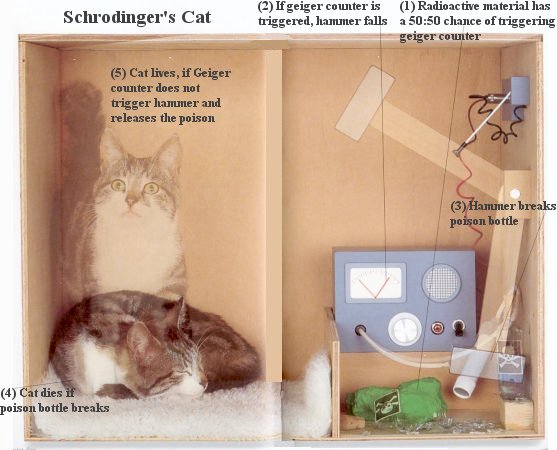The laws of physics are the same forwards in time as they are backwards, right?
At least, that's what some physicists will tell you. They have (some) good reasons for saying this. After all, if you watch the planets orbit the Sun, they look like they obey the same laws of physics whether you watch them orbit clockwise (forwards in time) or counterclockwise (backwards in time):
 There are certain things that are easy to do moving forwards in time, like to take a raw egg or two (left) and fry them (right).
There are certain things that are easy to do moving forwards in time, like to take a raw egg or two (left) and fry them (right).  Well, that's pretty easy.
Well, that's pretty easy.
But what about going backwards; what about taking a fried egg and turning it back into a raw one? Good luck with that. It doesn't happen. Why not? Because some things involve decision making; they contain more information. Think about the raw egg, for example. There are many, many possibilities for what that egg could become.

(This will teach me to blog when I'm hungry.) But once you've gone and cooked it, you can't go back! That's basically what the second law of thermodynamics tells you: once you do something to increase the amount of information in a system, you can't take it out without expending a tremendous amount of energy!
This is known, in layman's terms, as the arrow of time. Things get messier as you go forward in time. There are some things you can see that make perfect sense going both directions in time (like the planets orbiting the sun), and some things that only make sense going in one direction. Here's a short video clip with some examples of water; again, they only make sense going forwards in time:

But once I open it and find Shanie's corpse, there's nothing I can do to return the cat to a mixed dead/alive state. (Sorry, kitty!) And that's why the laws of physics aren't completely the same forwards as they are backwards.
Now, can someone tell me why physicists have trouble with this?
- Log in to post comments





Your above example illustrates that information is basically a reduction in uncertainty.
I thought the Second Law of Thermodynamics was a statistical artifact from the fact it is far more likely for things to get more "messy", as you put it, over time, rather than less, and that the Second Law is not a hard and fast law like Maxwell's laws are. I thought that physically, there's nothing stopping the cooked egg becoming raw, or the water jumping back into the cup, only that such things are massively improbable. Have I thought wrong?
My guess as to why it gives physicists trouble is that the basic laws of physics should be the same regardless of what direction the time arrow is pointed. But as you just illustrated, that is not always the case.
This doesn't explain anything. What you are really saying is that we perceive time to proceed only forward. Since time only moving forward is completely untestable with current technology, we can only speculate. It's a philosophical question, no more.
To be clear, I'm not disagreeing that time appears to move forward. I'm just saying that this is a highly complex issue that can't be resolved by using common sense. Physicists are justified in having trouble with this.
Philosophy has tried to work with it, and Terry Pratchett did something similar in "The Thief of Time". This is the physics theory problem of discussing time.
There's also the reverse-causality of human cognition: the bits of the brain involved in making a decision fire before the bits that consider the evidence. Human cognition has them deciding from information, whereas the brain is doing it the other way round.
That post-hoc rationalisation of a decision makes the common sense version actually physically incorrect.
Makes using it in discussing the physics of time rather difficult...
Alex, pretty damn close: you'd need a brain full of maths to make a better description, and the definition becomes somewhat self-referential: the arrow of time points in the direction of increasing entropy.
But entropy always increases with proceeding time (is the congruent rephrasing of the Second Law of Thermodynamics).
But we just defined time proceeding in the direction of increasing entropy.
GAAAH!!!